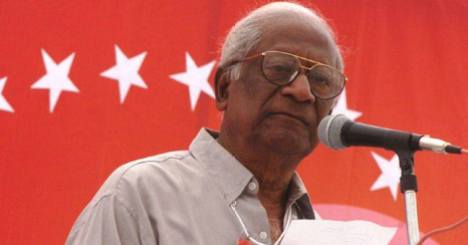By Saswat Pattanayak
Comrade A B Bardhan (1924-2016) was not just the foremost communist mass leader of India who raised working class consciousness among millions through his oratory and organizational persistence, he was also the Marxist historian who accounted peoples’ struggles like no one else had quite done.
Well before publishing “People’s History” had become a worldwide trend, Comrade Bardhan had reflected upon the critical role of working class in India’s freedom struggle with these words –
“Official histories are apt to pass over in silence the role of the working class in India’s freedom struggle. They depict the freedom struggle as a series of events determined and influenced by individuals from the upper strata of society, who reacted against the humiliation and oppression of foreign rule, and moved the masses in their wake.
As to the workers and working people, they were considered either too weak or ignorant to play any role in this struggle, or concerned themselves with the more immediate problems of mitigating exploitation and improving their lot.
Nothing could be more one sided and false than this picture. In fact, with the growth of the working class in India and the rise of the labor movement commences the impact on India’s struggle against foreign domination.”
Well before social justice movements demanded reservations as part of parliamentary political norm, Comrade Bardhan had gone beyond the traditional proposals and recognizing the imminent pervasiveness of private capital, he had called for reservations in private sector as well –
“As Communists, we take note of the problems of the deprived communities in our society and pay special attention to them. These are for instance the dalits, the adivasis and the minorities, especially the Muslims. We shall actively support the demand that reservation should be extended to the private sector, especially when moves for privatization are afoot.”
Well before the caste discourse in public policies had gained momentum and denouncing Hindutva politics had become mainstream, and intolerance debate had gained a foothold in India to prompt celebrities in joining the chorus, Comrade Bardhan had urged the people to reject communal casteist elements from the political sphere, in these words –
“Neither Gandhi or Nehru nor the hundreds of martyrs who climbed the gallows for independence – none of them gave their lives for a Hindu nation.
Never forget that!
We who uphold the red flag – we respect all religions. For the identity and ego of one religion, you cannot attack and break the identity and faith of another religion.
Always remember this.
In Hinduism, there is both tolerance as well as intolerance. There is humanity, but there is also a caste system. That is why for years saints and enlightened ones have tried to bring in reforms. They raised their voices against casteism, but even today caste remains. Today a new effort is being made to share power with those who were always kept out of Government, those who were considered only fit to be servants. Today an effort is being made that they too get a chance to help run the country. But the very forces who wish to preserve Hindu fundamentalism and unfurl their flags over destroyed mosques, these very forces swear by the caste system.
Recognize them and understand their mentality.”

